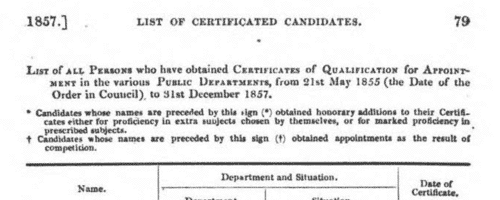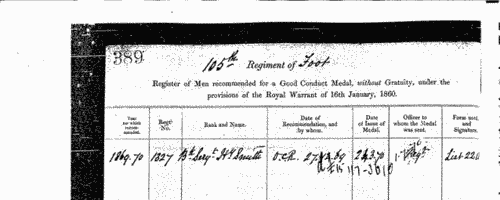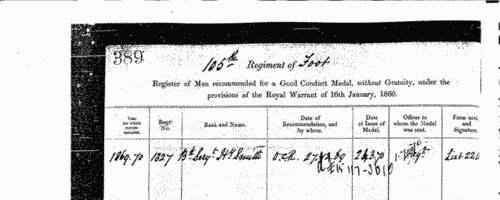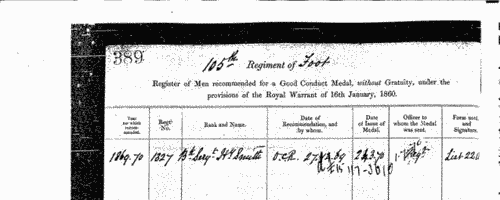Add this eBook to your basket to receive access to all 152 records. Our indexes include entries for the spelling ahern. In the period you have requested, we have the following 152 records (displaying 31 to 40): These sample scans are from the original record. You will get scans of the full pages or articles where the surname you searched for has been found. Your web browser may prevent the sample windows from opening; in this case please change your browser settings to allow pop-up windows from this site.  Sailors and marines awarded the Baltic Medal
(1854-1857) Sailors and marines awarded the Baltic Medal
(1854-1857)
During the Crimean War, a British and French fleet entered the Baltic, and captured Bomarsund harbour and one of the Aland Islands (now part of Finland). Bomarsund is the sound between the islands and the Swedish island of Vardo; and at the fine harbour on Bomarsund, dominating the entrance of the Gulf of Bothnia, and indirectly that of the Gulf of Finland, the Russians had constructed a northern naval base, and this was destroyed in the attack. The British fleet taking part in the Baltic expedition comprised Her Majesty's ships Aeolus, Ajax, Alban, Algiers, Amphion, Archer, Arrogant, Basilisk, Belleisle, Blenheim, Boscawen, Bulldog, Caesar, Calcutta, Centaur, Colossus, Conflict, Cornwallis, Cossack, Cressy, Cruizer, Cuckoo, Cumberland, Dauntless, Desperate, Dragon, Driver, Duke of Wellington, Edinburgh, Esk, Euryalus, Exmouth, Falcon, Firefly, Geyser, Gladiator, Gorgon, Hannibal, Harrier, Hastings, Hawke, Hecla, Hogue, Imperieuse, James Watt, Leopard, Lightning, Locust, Magicienne, Majestic, Merlin, Miranda, Monarch, Neptune, Nile, Odin, Orion, Otter, Pembroke, Penelope, Pigmy, Porcupine, Prince Regent, Princess Royal, Pylades, Resistance, Retribution, Rhadamanthus, Rosamond, Royal George, Royal William, Russell, St George, St Jean D'Acre, St Vincent, Sphinx, Stromboli, Tartar, Termagant, Tribune, Tyne, Valorous, Volage, Volcano, Vulture, Wrangler and Zephyr. This is the medal roll of the naval and marine claimants who qualified for the Baltic Medal for service in 1854 to 1855. The medals were dispatched in batches from early 1857, the first batch being numbered B A 1, the next B A 2, &c.; then follows the destination (a place or, more usually, a ship) and the date of dispatch. Most of the medals had been sent by the end of 1857. | Sample scan, click to enlarge

| Civil Service Appointments
(1855-1857)
The Civil Service Commission published this annual list of all persons who had obtained certificates of qualification for appointment in the various public departments. The list gives full name (surname first); department (such as Post Office, or Inland Revenue); situation (such as Letter-carrier, or Clerk); and date of certificate. Candidates whose names are preceded by a dagger obtained appointments as the result of competition. Those whose names are preceded by an asterisk obtained honorary additions to their certificates either for proficiency in extra subjects chosen by themselves, or for marked proficiency in the prescribed subjects. This list covers the period from 21 May 1855 (the date of the original Order in Council) to 31 December 1857. | Sample scan, click to enlarge

|  Sailors and marines on board Her Majesty's ship Calcutta
(1856-1860) Sailors and marines on board Her Majesty's ship Calcutta
(1856-1860)
The China Medal was awarded to soldiers and sailors involved in the various actions of the war against China, in which this ship was engaged from 1856 to 1860. The medals were either delivered on board or sent on in 1862: except that many of the men were no longer immediately traceable, and the remarks on the roll show that some medals were not sent on for several years, and some were never sent. After the main roll there is a section showing which of the men also qualified for clasps. Separate clasps were awarded for men who had been in receipt of the China Medal of 1842; for the taking of Fatshan in 1857, Canton in 1857, Taku Forts in 1858, Taku Forts in 1860, and Pekin in 1860. Most of the men on this ship are shown as having been given the Fatshan clasp, for being actually present during the successful operations against the Chinese war junks in the Escapo creek, which commenced 25 May and were finally closed at Fatshan 1 June 1857; the Canton clasp, for being actually present at Canton on 28 and 29 December 1857, when that city was bombarded and finally captured; and the Taku Forts 1858 clasp, for being actually engaged in the operations which ceased with the first capture of the Taku Forts, 20 May 1858, and led to the Treaty of Tientsin. | Sample scan, click to enlarge

|  Sailors and marines on board Her Majesty's ship Inflexible
(1856-1860) Sailors and marines on board Her Majesty's ship Inflexible
(1856-1860)
The China Medal was awarded to soldiers and sailors involved in the various actions of the war against China, in which this ship was engaged from 1856 to 1860. The medals were either delivered on board or sent on in 1862: except that many of the men were no longer immediately traceable, and the remarks on the roll show that some medals were not sent on for several years, and some were never sent. After the main roll there is a section showing which of the men also qualified for clasps. Separate clasps were awarded for men who had been in receipt of the China Medal of 1842; for the taking of Fatshan in 1857, Canton in 1857, Taku Forts in 1858, Taku Forts in 1860, and Pekin in 1860. Most of the men on this ship are shown as having been given the Canton clasp, for being actually present at Canton on 28 and 29 December 1857, when that city was bombarded and finally captured. | Sample scan, click to enlarge

|  British riflemen fighting in China
(1860) British riflemen fighting in China
(1860)
The China Medal was awarded to soldiers and sailors who took part in the prosecution of the war against the Chinese from 1856 to 1860. Separate clasps were awarded for men who had been in receipt of the China Medal of 1842; for being actually present at Canton on 28 and 29 December 1857, when that city was bombarded and finally captured; for being actually engaged in the operations which ceased with the first capture of the Taku Forts, 20 May 1858, and led to the Treaty of Tientsin; for being actually present at the capture of the Taku Forts 21 August 1860; and for being actually present before Pekin the day the gate of that city was given up to the allied (British and French) army, viz. on 13 October 1860. The 2nd battalion, the 60th (The King's Royal Rifle Corps) Regiment, based in Winchester, embarked for the Cape of Good Hope in June 1851, and after taking part in the Kaffir War, was moved to India, where it helped deal with the Mutiny. In 1860 the battalion was transferred to China. The regiment took part in the capture of the Taku Forts and that of Pekin. | Sample scan, click to enlarge

| Stockton-on-Tees Voters: Stockton Polling District
(1868)
This poll book for the First Parliamentary Election for the Borough of Stockton-on-Tees lists the voters alphabetically by polling district, with full name (surname first) and address. In the right-hand column D represents the Liberal candidate, Joseph Dodds, Esq., and V the Conservative, Lord Ernest Vane Tempest. The three polling districts were Norton, Stockton (including so much of Linthorpe as lay within the parliamentary borough of Stockton), and Thurnaby. At the end of each district the handful of lodger voters are listed separately. | Sample scan, click to enlarge

|  Men of the 57th Regiment who fought in the New Zealand War
(1860-1870) Men of the 57th Regiment who fought in the New Zealand War
(1860-1870)
New Zealand War Medal roll for the 57th (The West Middlesex) Regiment of Foot: for service in the New Zealand campaign 1863 to 1867: the rolls were compiled following a general order in 1869 and the medals were distributed in 1870. The regiment had been serving at Poonah in India, and was moved to New Zealand in November 1860; the men returned to England in April 1867. | Sample scan, click to enlarge

|  Outstanding soldiers of the 101st regiment of Foot
(1860-1870) Outstanding soldiers of the 101st regiment of Foot
(1860-1870)
The 1st Bengal European Fusiliers were renamed the 101st Royal Bengal Fusiliers in 1861, and moved from India to England. Each year just a handful of outstanding soldiers of the regiment were chosen for good conduct medals and gratuities: these are listed here. There were two lists, one for men recommended for the Good Conduct Medal without a gratuity, and one for gratuities - £5 to a private, £10 to a corporal, and £15 to a serjeant. Both lists are indexed here, and each gives rank, name, regimental number, date of recommendation and date of issue. (The sample scan is from the 105th foot) | Sample scan, click to enlarge

|  Outstanding soldiers of the 82nd regiment of Foot
(1860-1870) Outstanding soldiers of the 82nd regiment of Foot
(1860-1870)
The 82nd Regiment of Foot (The Prince of Wales's Volunteers) fought in the Crimea, then in 1857 was sent to China: in India it was present at the capture of Lucknow. In 1869 the regiment was moved to Aden. It returned to England in 1870: the regimental depot was at Canterbury. Each year just a handful of outstanding soldiers of the regiment were chosen for good conduct medals and gratuities: these are listed here. There were two lists, one for men recommended for the Good Conduct Medal without a gratuity, and one for gratuities - £5 to a private, £10 to a corporal, and £15 to a serjeant. Both lists are indexed here, and each gives rank, name, regimental number, date of recommendation and date of issue. (The sample scan is from the 105th foot) | Sample scan, click to enlarge

|  Outstanding soldiers of the 84th regiment of Foot
(1860-1870) Outstanding soldiers of the 84th regiment of Foot
(1860-1870)
The 84th (York and Lancaster) Regiment of Foot returned to England from India in 1859: the regimental depot was at Pembroke, and the troops were stationed at Sheffield. In 1865 the regiment was sent to Malta; in 1867 on to Jamaica; and in 1870 to Halifax, Nova Scotia. Each year just a handful of outstanding soldiers of the regiment were chosen for good conduct medals and gratuities: these are listed here. There were two lists, one for men recommended for the Good Conduct Medal without a gratuity, and one for gratuities - £5 to a private, £10 to a corporal, and £15 to a serjeant. Both lists are indexed here, and each gives rank, name, regimental number, date of recommendation and date of issue. (The sample scan is from the 105th foot) | Sample scan, click to enlarge

|
Research your ancestry, family history, genealogy and one-name study by direct access to original records and archives indexed by surname.
|












